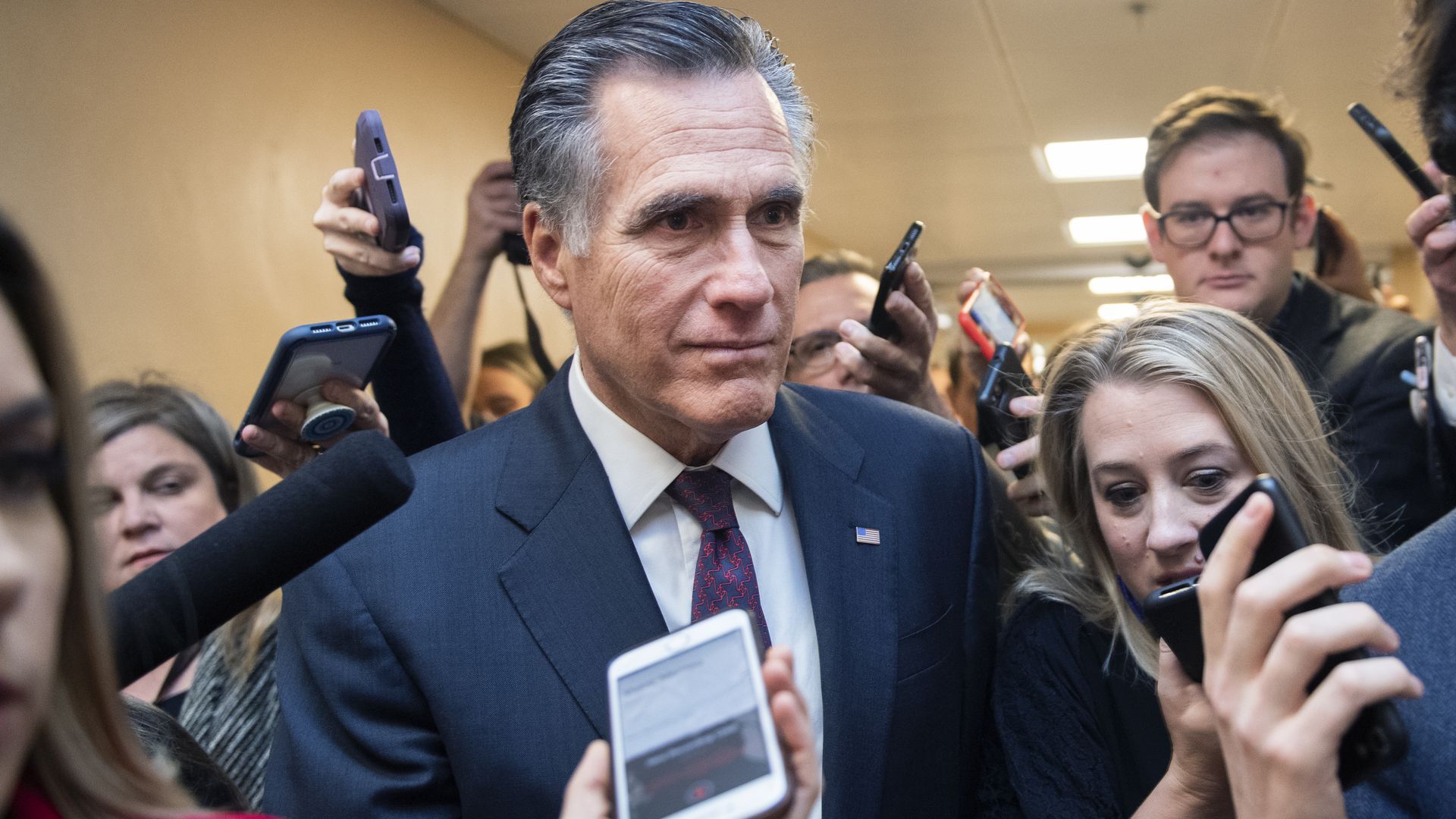What senators will ask during impeachment trial's question time
Add Axios as your preferred source to
see more of our stories on Google.

Sen. Mitt Romney speaks with reporters in the Senate subway on Tuesday. Photo: Tom Williams/CQ-Roll Call, Inc via Getty Images
Senators plan to grill House managers and White House lawyers on a series of questions as President Trump's impeachment trial enters a contentious new phase on Wednesday.
Why it matters: The 16-hour Q&A session, which is expected to be split over two days, is a crucial period that will solidify whether senators feel satisfied with the evidence they have, or if they will vote to bring in additional witnesses and documents.
- This period has become even more significant in the past 24 hours, after top Republican leaders told their conference that they do not yet have the 51 votes needed to block new witnesses.
How it works: Each party will alternate submitting written questions to Chief Justice John Roberts, who will read each question aloud.
- The questions must be signed by the senator or group of senators asking it, and they can be directed to either House managers or Trump's defense team. Senators cannot ask each other questions.
- There is no official time limit restricting House managers' or the White House team's response.
- Senators cannot challenge the content or form of the answers given.
What we're hearing: Senators, who have been required by law to remain silent during the trial's floor proceedings, are eager to finally have an opportunity to actively participate in the trial.
- Both Democrat and Republican senators have been coordinating internally with members of their party to ensure they hit all of the most important topic areas and that there's no overlap.
- According to my latest conversations with Democrats, they are eager to ask questions that expose the Trump defense team's "gaps in direct knowledge and facts," as one senior aide described it, and underscore the need to hear from witnesses who could provide a firsthand account of Trump's diplomacy with Ukraine.
- Meanwhile, many of the president's fiercest Republican allies are interested in asking questions about corruption in Ukraine, with the goal of eliciting answers that justify Trump's desire to investigate former Vice President Joe Biden and his son Hunter. They'll also ask some that are designed to poke holes in House Democrats' impeachment process.
What they're saying:
- Sen. Doug Jones (D-Ala.), who faces a competitive reelection fight in the fall: "I want to confirm that Rudy Giuliani was working personally for the president and not on the behalf of the United States of America."
- Sen. Kevin Cramer (R-N.D.) also said he's "a little bit curious about Rudy Giuliani." But he added, "Another question is like another witness. I’m not looking for more information."
- Sen. Ed Markey (D-Mass.): "I've called constitutional law professors and trial attorneys to elicit from them what they think would be the best questions."
- Sen. Josh Hawley (R-Mo.) told reporters he'd like to ask about the whistleblower complaint, and whether they had inappropriately communicated with lead House manager Adam Schiff (D-Calif.). He's also eager to ask about Hunter Biden.
- Sen. Chris Coons (D-Del.) wants to ask about the White House memo of the July 25 call between Trump and Ukrainian President Zelensky: "Trump's attorneys fairly forcefully said, 'In an unprecedented act of transparency, he released the full transcript.' Did he? ... Are we sure we've got the whole thing?"
- Sen. Kirsten Gillibrand (D-N.Y.): "It will be methodical. It will be by topic, and it will be by who receives the questions."
The bottom line: How the next two days play out will determine whether the impeachment trial will come to a close as early as the end of this week, or if key senators want more time and information ahead of delivering their final verdict on Trump.
Go deeper:
